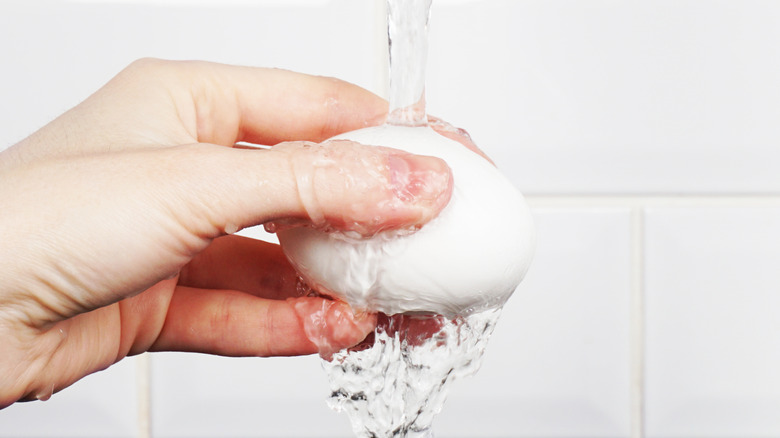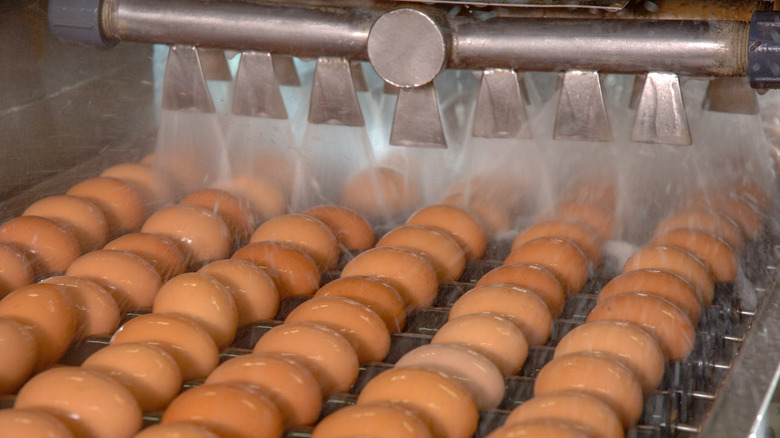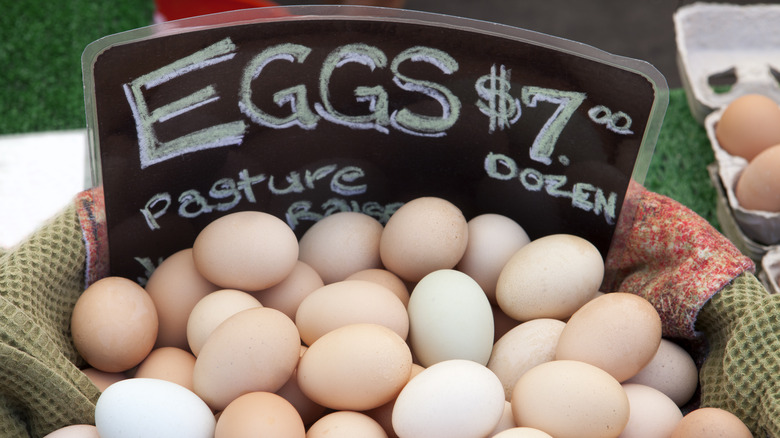Why You Shouldn't Wash Store-Bought Eggs
Have you ever been told to wash your eggshells before cracking them and using them in a recipe? Perhaps it was a tip passed down from your grandmother, who grew up on a farm. While seemingly benign at first glance, this practice might do more harm than good. Sorry grandma, but washing store-bought eggs can actually increase the risk of Salmonella contamination, turning this simple, intended-as-precautionary step into a health hazard.
The reason for this has to do with the way eggs are processed. In the United States, the USDA requires that store-bought eggs go through meticulous cleaning steps. While this practice does remove unsightly dirt and grime, it also removes a delicate, naturally occurring protective layer from the egg, known as the cuticle. Once its protective barrier has been removed, the eggshell underneath is surprisingly porous. So porous that it lets bacteria in when washed or not refrigerated properly.
Salmonella can potentially penetrate those vibrant egg yolks in a couple of ways — either it starts in the ovaries of a hen or it enters from the outside via cracks and pores. (Since hens both lay eggs and defecate through the cloaca, you can guess where some external contaminants might come from.) Although the bacteria in question, Salmonella, doesn't make hens feel sick, it can do a real number on humans, causing fever, diarrhea, cramps, and even severe disease.
How American eggs are kept clean and safe
Over the past hundred years, egg cleanliness practices have shifted significantly, so don't blame your grandmother or anyone else for having strong opinions about egg washing. Historically, washing eggs at home to remove particulates was the norm, but this left room for human error and contamination. In response, the USDA developed egg-washing procedures on an industrial scale, and by 1970, it required commercial egg producers to wash their eggs.
This process involves a lot more than dunking eggs in water. Commercially, eggs are washed using machines that coat them in hot, soapy water, removing contaminants (along with the egg's protective cuticle). Post-wash, the eggs are often sprayed with oil to replace the lost protective layer and then refrigerated.
Refrigeration is crucial for protecting cuticle-free, washed eggs and extending their shelf-life. For U.S. consumers, this means store-bought eggs should be stored in the refrigerator and not washed at home. Cooking eggs thoroughly and avoiding eating raw egg yolks (even in delicious cookie dough) is also recommended to reduce Salmonella risk.
The case for skipping egg wash day in other countries
While Japan, Australia, and Scandinavian countries adhere to similar egg washing and refrigeration practices as the U.S., most European countries don't refrigerate their eggs (or wash them). This difference in egg-handling practices stems from a different method of tackling the same problem: preventing Salmonella. Since these eggs are not washed vigorously before being sold, their cuticle remains intact, protecting the egg from bacterial invaders. Some European countries take an additional step of vaccinating hens against Salmonella, reducing the risk of contamination at the source.
When procuring unwashed eggs, either from a local farmer or backyard hens, it's essential to store them properly, give them a gentle wipe and rinse right before use, and use them within about two weeks when stored on the countertop or three months inside the refrigerator. But if you're using store-bought eggs, skip the wash and enjoy your eggs with the peace of mind that they've already been scrubbed.


